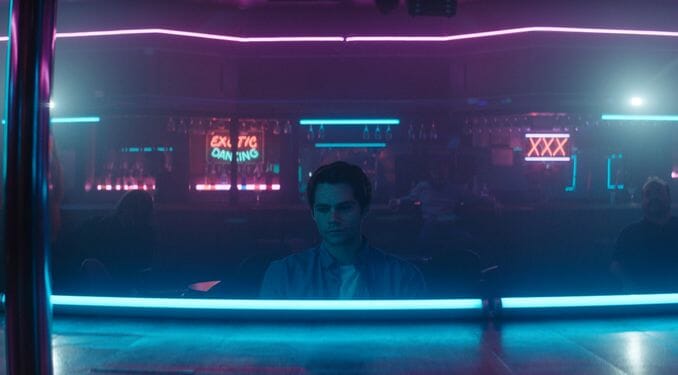Dylan O’Brien’s Solid Performance Is All That’s Clear in Flashback‘s Imposing, Imperfect Sci-Fi

This is a film you don’t spoil, so I won’t. Welcome to Flashback, a movie somehow about time travel (kinda), drugs (kinda) and letting go of what you know as you become an adult. Written and directed by Christopher MacBride, the sci-fi thriller drags its audience through an unsettling rabbit hole of discovery that profoundly alters the way its leads—Dylan O’Brien and Maika Monroe—view their world and their choices. In turn, the film poses those questions to its viewers, and they aren’t easy topics to grapple with. Neither is the movie itself, really; it is a labor, but not without its rewards.
Fred Fitzell (O’Brien) is an average guy walking headfirst into an average life, complete with an office job, new home and fiancée. When he starts having visions of a former classmate (Monroe) who went missing before graduation, he becomes obsessed with figuring out what happened to her—and she seemingly leads him to the inconceivable answer, which unravels everything he built for himself since he last saw her. In turn, the journey becomes as Earth-shattering to us as it is to him. In order to achieve that effect, it’s clear the intent was to have the audience feel as disoriented as Fred throughout the film.
Though Flashback’s foreshadowing is a bit cluttered and at times messy, the lead-up to the film’s climax is purposefully, puzzlingly cerebral—but the climax itself is, well, nearly as satisfying as an orgasm. Sorry, but it’s true. It’s a reveal that weaves together three dominant tropes (to name them would be a spoiler, in a way) bizarrely, yet nicely. MacBride executes the moment with quick cuts and striking imagery that likens itself to that one horrific scene in Fire in the Sky. But the central truth we learn during the reveal is what will really make you gasp and draw you in; it asks you, like it asks Fred, to question your reality and tells you why. The minute details are scarce but, truthfully, they aren’t necessary to shake you to your core and leave you feeling surveilled and shaken. But MacBride packages the knowledge in a way that doesn’t understate how ultimately spectacular it is and, in turn, it elicits a strange sense of hope. Or understanding. Or acceptance of the confusion and causality of life. There’s a lot of emotions there and I feel they may be different for every individual who watches.
I will admit, I had to watch the film a few times in order to decide how I felt about it. It’s not an easy movie to digest or dissect, and you really do have to turn your phone off and pay attention. It also benefits from multiple viewings: My opinions changed after my second and third watches; I picked up on things I had missed when I saw it for the first time. But this also leads me to believe this film won’t be for everyone, so don’t @ me if it doesn’t work for you. It nearly didn’t for me. Sit with it for a while.
-

-

-

-

- Curated Home Page Articles By Test Admin October 21, 2025 | 3:10pm
-

- Curated Home Page Articles By Test Admin October 21, 2025 | 2:57pm
- Urls By Test Admin October 21, 2025 | 2:57pm
- Curated Home Page Articles By Test Admin October 21, 2025 | 2:55pm
-

-

-

-

-

-

-

-

-

-

-

-

-

-

-

-

-

-

-

-

-

-

-

-

-

-

-

-

-

-

-




































